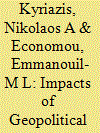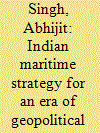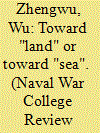| Srl | Item |
| 1 |
ID:
186525


|
|
|
|
|
| Summary/Abstract |
This paper sets out to explore whether the Turkish geopolitical uncertainty exhibits significant linkages with fluctuations in the Turkish lira (TRY) values against other currencies. The period examined covers the Erdoğan administration (March 2003 up to the present). The innovative geopolitical uncertainty index by Caldara and Iacoviello and modern GARCH methodologies are adopted in order to explore how geopolitical risk influences currency values and the overall economy during this turbulent period. Econometric outcomes reveal that geopolitical uncertainty leads to devaluation of TRY against the US dollar, the Swiss franc and the Swedish krona but in a non-significant manner whereas mixed results emerge concerning the impacts of macroeconomic or financial variables.
|
|
|
|
|
|
|
|
|
|
|
|
|
|
|
|
| 2 |
ID:
140955


|
|
|
|
|
| Summary/Abstract |
The fractious nature of maritime relations in the Asia-Pacific region is a recognisable feature of international geopolitics today. Following China’s massive reclamation and ‘island-building’ project in the South China Sea recently, many Pacific states have moved to bolster their maritime postures. While Japan has sought legislative amendments to liberate its maritime posture from post-war passivism, Vietnam and the Philippines have been building stronger navies aimed at countering China’s hostile moves in the South China Sea. Meanwhile, Indonesia has sought to renew its capabilities as a maritime power through a new ‘maritime axis’ strategy, while Australia has boldly advocated an ‘Indo-Pacific’ framework for joint security endeavours and the creation of ‘middle-power coalitions’. In the interim, Russia has updated its maritime doctrine, announcing its military partnership with China as the cornerstone of its naval strategy in the Pacific.
|
|
|
|
|
|
|
|
|
|
|
|
|
|
|
|
| 3 |
ID:
133381


|
|
|
|
|
| Publication |
2013.
|
| Summary/Abstract |
China's maritime development having come up against pressures and challenges in recent years, the concept of "strategic hedging"-that is, pursuit of and investment in policies meant to protect the nation against the effects of geopolitical and economic uncertainty-has emerged. One of its most important proponents is Gao Bai, an ethnic Chinese professor of sociology at Duke University (in Durham, North Carolina) and the author of the article "The High-Speed Railway and China's Grand Strategy in the 21st Century" ....1 Professor Gao believes that the 2008 global financial crisis and the return, through its own strategic adjustment, of the United States to the Asia-Pacific region mean that China's "blue-water strategy" has come to an end.
|
|
|
|
|
|
|
|
|
|
|
|
|
|
|
|